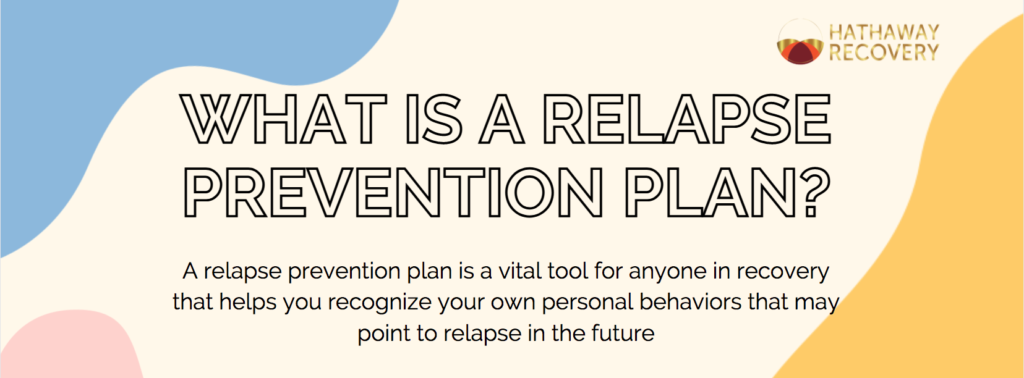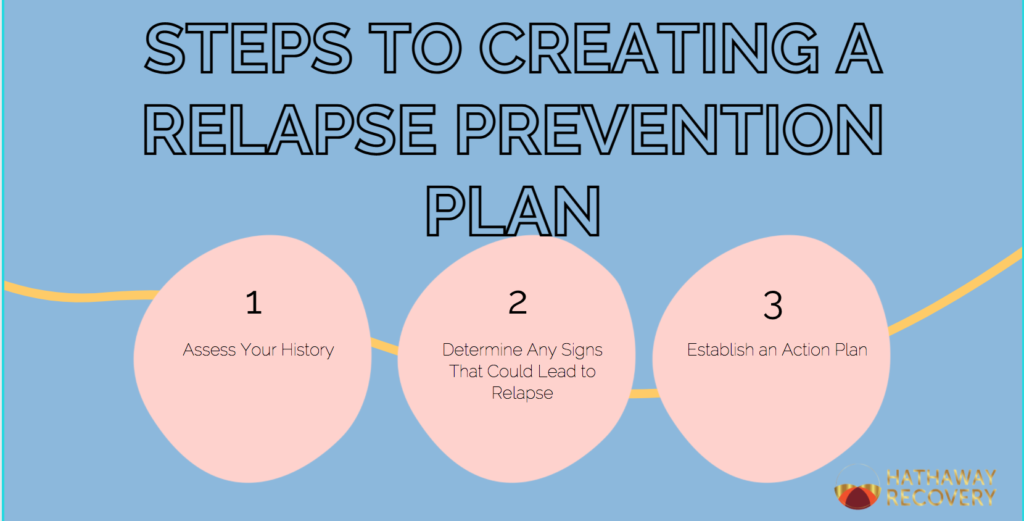
A relapse prevention plan is a way to reduce the risk of relapse and help people stay in recovery longer.
There is a possibility of a relapse.
It is possible to relapse. No matter how long you have been sober, you can relapse.
The longer you stay sober, the less likely you are to relapse. If you stick with it, you can reduce the chance of relapse. In the first two years, 21.4% of people relapsed. In the third through fifth years, the number of people dropped to 9.6%. In the fifth year, 7.2% relapsed, and in the sixth year, 7.2% relapsed.
It is vital to have a plan for when you relapse, which is also known as a “relapse prevention plan.” The difference between a prolonged period of sobriety or repeated relapse could be made by learning how to create a relapse prevention plan.
What is a Relapse Prevention Plan?
Relapse prevention plans are a crucial tool for anyone who is in recovery. A plan will help you identify your potential relapse points and allows you to decide how to prevent them. The plan also includes ways to overcome these behaviors and get back on the right track.
A relapse prevention program is usually a written document that a person creates together with their treatment team and then shares with their support groups. This plan provides a roadmap for how to respond to cravings and triggers.
Relapse is not usually a sudden event. It is usually a three-part process that includes:
- Emotional relapse
- Relapses in the mind
- Relapses in the physical
A relapse prevention program allows you to recognize and respond to certain emotions and events. This will help avoid a physical relapse, which is when someone relapses to using drugs or alcohol.

Steps for Creating a Relapse Prevention Plan
Although you can create a relapse prevention program on your own, it is better to have someone with expertise in the subject, like a substance abuse counselor. Then, you can either write or speak out your relapse plan to give you a clearer idea of the steps to take if it becomes a reality. It is important to remember the following points when creating a plan for relapse prevention.

1. Examine your past with drugs and alcohol
Here are some questions you should ask yourself before creating a plan to prevent relapses.
- Did you ever feel more likely to use substances at a particular time?
- Were there any people who influenced the times you used?
- Which thought patterns are more likely to lead you to use them?
- Why did you relapse?
It is crucial to determine what caused the previous relapse to avoid them in the future.
2. Recognize any signs that could indicate a relapse
You can brainstorm possible relapse scenarios and identify warning signs. When relapse is imminent, some people start to behave and feel differently.
A list of warning signs can help people gain more insight into their relapse. The list can be shared with the treatment team to provide the needed information to prevent relapse.
3. Create an Action Plan
Make a relapse prevention plan to help you avoid relapsing to alcohol or drugs. For example, if you are going through a divorce, other options may be for your frustration and pain. Instead of resorting to drinking or using, you can attend a support group or call a close friend or family member. You will be less likely to relapse if your action plan is more detailed.
You should know who to call first, what questions you will ask them, and whether you will attend a meeting or return to rehab. You will have a better chance of getting back on track quickly if you make your plan as detailed as possible. If you have any questions, make sure that your plan includes the right people.
What to include in a Relapse Prevention Plan Template
Although each person’s addiction relapse prevention plan is unique, there are specific components that can be helpful to include in a final plan.

1. Triggers
List the people, places, and things that could lead to a relapse. Anything that can lead to relapse is a trigger. You may not be able to list all possible triggers.
Sometimes, you will not know a catalyst until it’s already there. These questions can help you identify triggers.
- Whom could I look that would remind me of my drug use?
- What are the feelings that are associated with relapse?
- What are some addictive thoughts that could lead to relapse?
- Where did I get drugs that could cause me to become agitated?
- What should I do if triggers are not avoided?
- Are there times of the year or anniversaries that trigger relapses?
2. How to manage your cravings
Cravings refer to the desire to use something again. Sometimes, cravings can lead to relapse. A solid plan will help you overcome cravings.
Make a list of people you can call if you feel the need to talk about cravings. Also, make a list of what you can do to avoid cravings. Substance abuse is a debilitating coping skill. Healthy coping skills can prevent relapse and lead to positive long-term outcomes.
3. Preventative Tools
Make a list of the helpful relapse prevention tools during your recovery. Consider what you could do instead of using and how these activities can help you get back on track. These are some examples of such tools:
- Online rehab support and continuing programs
- Exercising
- Participating in a support meeting
- Write a gratitude list
- Write a list of possible consequences in case you relapse
- Journaling
- Prayer and meditation
People can also be preventative tools. For example, it can significantly reduce cravings and relapse by reaching out to supportive friends.
4. Support groups and programs
When facing a relapse, it can be beneficial to reinvest your energy and time in support groups or online support groups. Then, you can go back to the 12-steps program and evaluate your place.
A sponsor is also a good idea. If you feel the possibility of a relapse, a sponsor should be your first point of contact. They may have insight or suggestions because they have likely been there.
There are many support groups available that don’t follow the twelve-step model. Don’t let your past experiences stop you from making progress. Instead, find new ways to meet people who understand your struggles with addiction.
5. Lifestyle changes
You can make a plan to prevent relapse. This can help you understand why you got sober and motivate you to make positive changes.
Your relapse prevention plan may need to be reviewed as time goes by. Your recovery plan, which you established at the beginning of your recovery, can change over time. So will your support network. You can do this on your own or with professional help.
Every person’s needs are different, so you must assess your current situation and be honest with yourself.
Relapse Prevention Models
There are many views about human nature and different therapy models. Relapse prevention is no exception. These relapse prevention models provide a unique perspective on the process.
Gorski-Cenaps Relapse Prevention Model
Terry Gorski is an internationally renowned expert in substance abuse, mental illness, and crime. He outlines the nine essential steps in creating a CENAPS plan of relapse prevention (or a Gorski relapse preventive plan).
- Self-regulation: Social, psychological, and physical stabilization
- Integration: Complete a self-assessment
- Understanding: Learn about relapse signs and preventative methods
- Self-knowledge: Recognizing warning signs that you are most likely to relapse.
- These warning signs can be managed effectively with good coping skills
- Change: Revision of the recovery plan
- Awareness is gained through consistent practice and awareness
- Support: The involvement and support of significant others
- Maintenance: A comprehensive follow-up plan
Marlatt’s Model of Relapse Prevention
This relapse model was created by Dr. Gordon Alan Marlatt (University of Washington Psychology Professor). It focuses on high-risk situations.
The Marlatt Model shows how tonic (stable) and phasic(short-lived) influences interact to determine the likelihood of a relapse. These two variables differ in that tonic processes indicate how likely one is to relapse, while phasic reactions serve as factors that cause or prevent relapse.
Additional Workbooks and Worksheets for Relapse Prevention
To help you keep sobriety, there are many relapse prevention workbooks. Many have worksheets you can fill out to assist you in self-assessment.
- The Mission Consumer Workbook Maintaining Independence and Sobriety Through Systems Integration, Outreach and Networking
- Relapse Prevention Tool Sheets by Peggy Ferguson Ph.D.
- My Relapse Prevention Workbook Montgomery County Emergency Service, Inc.
- Cognitive and Behavioral Relapse Strategies United Nations Office on Drugs and Crime
- Relapse Prevention Book by Bradley A. Hedges Ph.D., LPCC Psychologist
- Relapse Prevention Workshop Using Relapse Prevention Therapy And Relapse Prevention Counseling Workbooks
Hathaway Recovery is available to help you or your loved one suffering from addiction. Our professionals can help you choose the best treatment option for your situation. We are here to help. Get in touch today.






